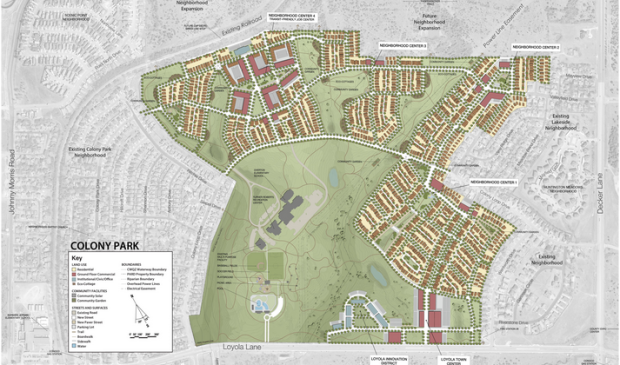ZAP backs Colony Park despite ‘missing middle’
Wednesday, September 24, 2014 by
Tyler Whitson The Zoning and Platting Commission recommended a Planned Unit Development rezoning request for the Colony Park Sustainable Community Initiative last week, despite concerns about a potential “missing middle” effect on affordability.
The community would comply with the city’s SMART Housing regulations, dedicating 20 percent of its residential units to serving households at or below a median family income of 80 percent.
Though commissioners supported this and other aspects of the development, some raised concerns that it may not do enough to serve middle-income households.
“I would have hoped that more of Colony Park was at least envisioned to have some mechanism of protecting a broad range of housing types at the median income,” Commissioner Rahm McDaniel said. “If you do a good job, it will get popular, and it will begin to cost more as people want to move in.”
The Austin Housing Finance Corporation submitted the plan to construct the community on its undeveloped 208-acre tract along Loyola Lane, between Johnny Morris Road and Decker Lane. The project planning is funded through a three-year U.S. Department of Housing and Urban Development Sustainable Communities Challenge Grant.
The development, which the Environmental Board has approved, would be a mix of commercial, office, residential, parkland and other uses. Agent Laura Toups of the Urban Design Group noted that adjacent neighborhoods already include relatively high volumes of income-restricted housing.
McDaniel said the Mueller development — which commits 25 percent of its units to affordable housing — is an example of the missing middle effect. He said that a population influx has raised the starting price for the rest of Mueller’s housing to six-and-a-half times Austin’s median household income.
“We can’t just assume because the population around (Colony Park) now is potentially less advantaged than other areas of the city that it won’t become more attractive,” McDaniel added.
Toups agreed that this could become a problem. “We think, on Day One, the market rate product will be affordable,” she said. “But as this gets more successful … it will go up.”
Toups added that those involved are exploring ways for the city to “hit that missing middle,” such as establishing land trusts.
McDaniel encouraged those involved “to continue and be creative,” look beyond land trusts and explore ideas on the product side.
As a Mueller resident, McDaniel said he has been able to stand in his front yard and “watch Austin lose 300 acres of middle-class housing,” adding that he “would hate to see us do that again.”
You're a community leader
And we’re honored you look to us for serious, in-depth news. You know a strong community needs local and dedicated watchdog reporting. We’re here for you and that won’t change. Now will you take the powerful next step and support our nonprofit news organization?









